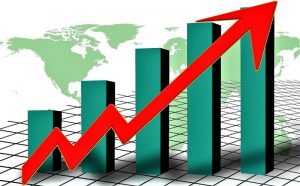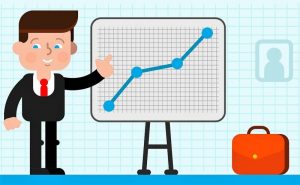Inflation
In a few words, we can say that inflation is the long-term increase in the cost of goods and services caused by the devaluation of the currency. While there are some advantages over inflation, there are also many negative aspects to it. Inflation problems occur when an unexpected inflation is experienced that does not adequately correspond to an increase in people's incomes.
What is inflation?
Inflation is the generalized and sustained increase in the prices of goods and services that a country has, which is measured by indicators which reflect the percentage growth of a moderate market basket.
If incomes do not increase along with commodity prices, everyone’s purchasing power has been effectively reduced, which in turn can lead to a slowdown or stagnation of the economy. In addition, excessive inflation can also wreak havoc on retirement savings by reducing the purchasing power of money saved by savers and investors.
Inflation characteristics
The main characteristics that we can mention with respect to inflation are the following:
- Inflation is the reflection of a country that is being misgoverned.
- It is usually accompanied by stagnation.
- There are generally few jobs and companies cannot find customers to sell their products.
- An imbalance is generated between production and demand.
- There is a continuous rise in the prices of most products and services.
- There is a decrease in the purchasing power of money.
- It is measured on the basis of the consumer price index.
History
The history of inflation goes back even to biblical times. In 1568, a French author known as Jean Bodin formulated the first theory of inflation for the first time in history within economic thought. He explained that; he explained that the monetary expansion affecting the metropolises was caused by the availability of large quantities of gold and silver, which were obtained from the exploitation of the mines of the American colonies.
Causes of inflation
Inflation occurs for the following reasons:
- Inflation is mainly caused by an increase in money supply that outpaces economic growth.
- National debt is another cause because as a country’s debt increases, the government has two options: they can raise taxes or print more money to pay off the debt. An increase in taxes will cause companies to react by raising their prices to compensate for the increase in the corporate tax rate. Alternatively, if the government chooses the latter option, printing more money will lead directly to an increase in the supply of money, which in turn will lead to currency devaluation and price increases.
- The effect of demand says that as wages rise within an economic system, people will have more money to spend on consumer goods resulting in an increase in product demand that will cause companies to raise prices to the level that the consumer can bear to balance supply and demand.
- Another factor driving prices of consumer goods and services is the cost-reducing effect.
Consequences
Inflation is capable of causing a country’s economic system to malfunction. These problems stem from its unpredictability. Its effects on proper distribution of income are based on the displacement of wealth from creditors to debtors, so savers lose the value of their funds.
There is an increase in tax revenue, and it acts as a tax that works covertly. The cost of money increases and investment decreases. Interest rates rise and only the strongest companies survive.
Advantages of inflation
Rising prices help reduce the value of household, corporate and government debts.
When there is inflation in an economy and our wages rise at the same rate, but the debt remains the same as before, the real value of the debt will be lower than before prices rose.
Rising prices also cause people to prefer to consume in the moment, because then prices will be more expensive. This is essential for money to circulate and to transmit goods in an economy. This is the first step for capitalism.
Disadvantages
Among the disadvantages, we can say that there is a loss of purchasing power because, if the rise in wages is not equal to the rise in prices, purchasing power will fall. In addition, it reduces the savings that can be generated because inflation causes money to lose value, and this makes people tend to consume and spend money, rather than save it, because if money is going to be worth less in the future, citizens and investors will prefer to spend it in the moment.
Some examples
- Argentina has one of the highest inflation rates. The country’s efforts to lower prices have been in vain because they have not been able to raise at the same time the prices of the public services on which the economy depends.
- Spain is approaching little by little the inflation that had already been foreseen by the government. The moderation that has been carried out has been influenced by transport and housing, the rise in the price of carbides and electricity.
- Mexico has seen a 22% increase in the last five years. National indices are the economic indicators that measure price changes through goods and services used by households.
How to cite this article?
Briceño V., Gabriela. (2019). Inflation. Recovered on 23 February, 2024, de Euston96: https://www.euston96.com/en/inflation/










